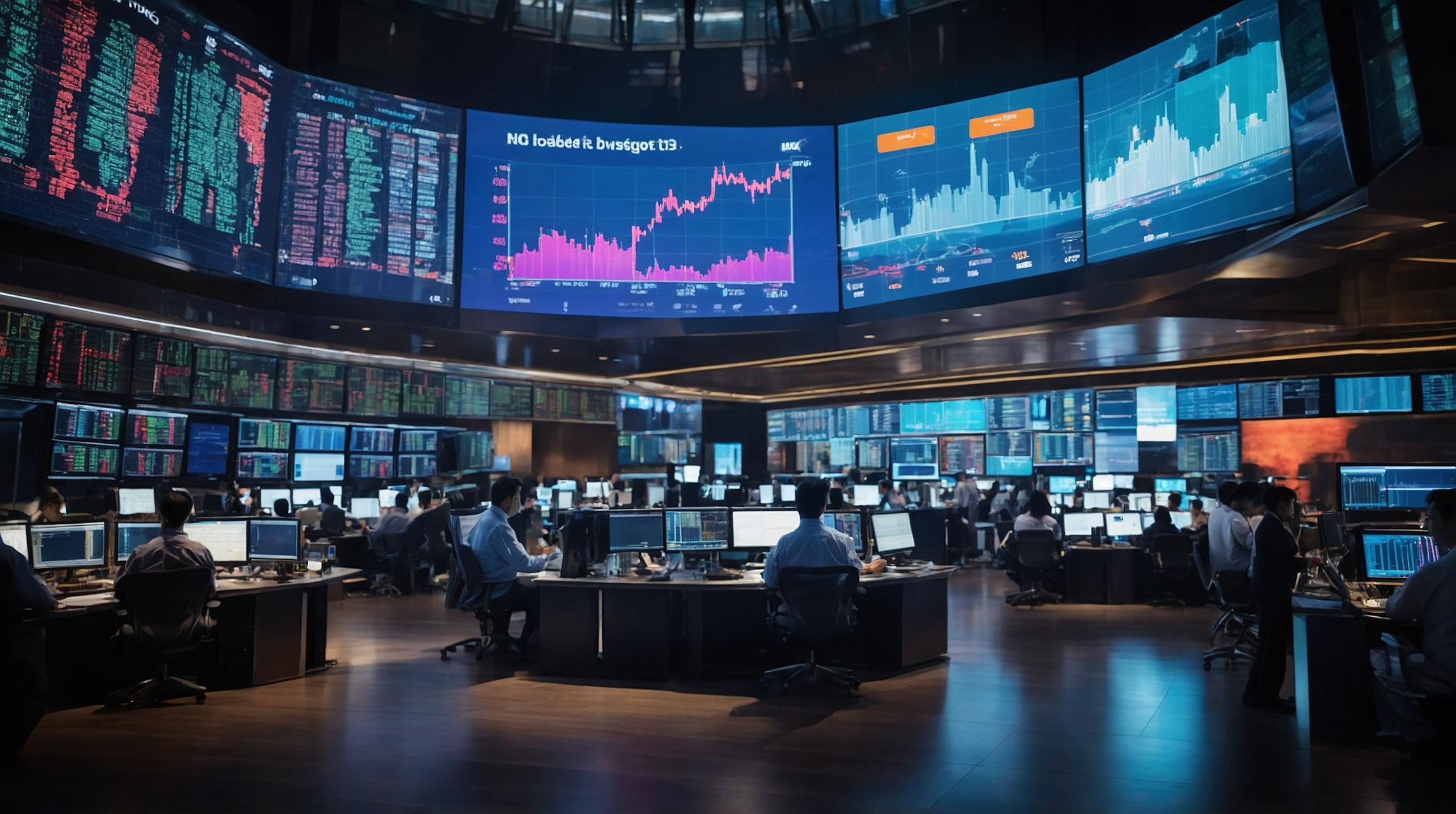The recent pullback in Asia-Pacific markets reflects growing investor caution amid Fed Chair Powell’s remarks on elevated equity valuations and an uncertain monetary policy outlook. While defensive sectors such as South Korean defense stocks benefit from geopolitical support, broader market sentiment remains fragile. !-- wp:paragraph -->
- Opportunities: Increased AI investments by companies like Alibaba could drive long-term tech sector growth.
- Risks: Persistent inflation and geopolitical tensions may weigh on market stability.
- Weather disruptions, such as Super Typhoon Ragasa, could impact regional economic activity.
- Central bank leadership changes, like in New Zealand, may influence local monetary policy direction.
Impact: Market sentiment is cautiously negative in the near term, with selective sector strength amid broader uncertainty.
!-- wp:paragraph --> Overnight in the United States, major stock indices closed lower. The S&P 500 dropped 0.55% to 6,656.92 after briefly reaching an intraday record high. The Nasdaq Composite fell nearly 1%, pressured by declines in prominent AI-related stocks including Nvidia, Oracle, and Amazon. The Dow Jones Industrial Average closed down 0.19% at 46,292.78. !-- wp:paragraph -->FinOracleAI — Market View
The recent pullback in Asia-Pacific markets reflects growing investor caution amid Fed Chair Powell’s remarks on elevated equity valuations and an uncertain monetary policy outlook. While defensive sectors such as South Korean defense stocks benefit from geopolitical support, broader market sentiment remains fragile. !-- wp:paragraph -->- Opportunities: Increased AI investments by companies like Alibaba could drive long-term tech sector growth.
- Risks: Persistent inflation and geopolitical tensions may weigh on market stability.
- Weather disruptions, such as Super Typhoon Ragasa, could impact regional economic activity.
- Central bank leadership changes, like in New Zealand, may influence local monetary policy direction.
Impact: Market sentiment is cautiously negative in the near term, with selective sector strength amid broader uncertainty.
!-- wp:paragraph --> Australia’s Consumer Price Index (CPI) for August rose 3% year-over-year, slightly surpassing economists’ forecasts of 2.9%, signaling persistent inflationary pressures. !-- wp:paragraph -->U.S. Markets Close Lower Amid AI Sector Uncertainty
Overnight in the United States, major stock indices closed lower. The S&P 500 dropped 0.55% to 6,656.92 after briefly reaching an intraday record high. The Nasdaq Composite fell nearly 1%, pressured by declines in prominent AI-related stocks including Nvidia, Oracle, and Amazon. The Dow Jones Industrial Average closed down 0.19% at 46,292.78. !-- wp:paragraph -->FinOracleAI — Market View
The recent pullback in Asia-Pacific markets reflects growing investor caution amid Fed Chair Powell’s remarks on elevated equity valuations and an uncertain monetary policy outlook. While defensive sectors such as South Korean defense stocks benefit from geopolitical support, broader market sentiment remains fragile. !-- wp:paragraph -->- Opportunities: Increased AI investments by companies like Alibaba could drive long-term tech sector growth.
- Risks: Persistent inflation and geopolitical tensions may weigh on market stability.
- Weather disruptions, such as Super Typhoon Ragasa, could impact regional economic activity.
- Central bank leadership changes, like in New Zealand, may influence local monetary policy direction.
Impact: Market sentiment is cautiously negative in the near term, with selective sector strength amid broader uncertainty.
!-- wp:paragraph --> The Hang Seng Index in Hong Kong and China’s CSI 300 index traded flat, as the region contended with the impact of Super Typhoon Ragasa. The Hong Kong Observatory reported hurricane-force winds in elevated and southern areas, with heavy showers and thunderstorms persisting. !-- wp:paragraph --> Alibaba Group’s Hong Kong-listed shares surged over 6% following CEO Eddie Wu’s announcement at the annual Apsara Conference in Hangzhou. The company revealed plans to increase its 380 billion yuan ($53 billion) investment in artificial intelligence infrastructure and introduced its largest AI language model, Qwen3-Max. !-- wp:paragraph -->Australian Inflation Exceeds Expectations
Australia’s Consumer Price Index (CPI) for August rose 3% year-over-year, slightly surpassing economists’ forecasts of 2.9%, signaling persistent inflationary pressures. !-- wp:paragraph -->U.S. Markets Close Lower Amid AI Sector Uncertainty
Overnight in the United States, major stock indices closed lower. The S&P 500 dropped 0.55% to 6,656.92 after briefly reaching an intraday record high. The Nasdaq Composite fell nearly 1%, pressured by declines in prominent AI-related stocks including Nvidia, Oracle, and Amazon. The Dow Jones Industrial Average closed down 0.19% at 46,292.78. !-- wp:paragraph -->FinOracleAI — Market View
The recent pullback in Asia-Pacific markets reflects growing investor caution amid Fed Chair Powell’s remarks on elevated equity valuations and an uncertain monetary policy outlook. While defensive sectors such as South Korean defense stocks benefit from geopolitical support, broader market sentiment remains fragile. !-- wp:paragraph -->- Opportunities: Increased AI investments by companies like Alibaba could drive long-term tech sector growth.
- Risks: Persistent inflation and geopolitical tensions may weigh on market stability.
- Weather disruptions, such as Super Typhoon Ragasa, could impact regional economic activity.
- Central bank leadership changes, like in New Zealand, may influence local monetary policy direction.
Impact: Market sentiment is cautiously negative in the near term, with selective sector strength amid broader uncertainty.
!-- wp:paragraph --> The Hang Seng Index in Hong Kong and China’s CSI 300 index traded flat, as the region contended with the impact of Super Typhoon Ragasa. The Hong Kong Observatory reported hurricane-force winds in elevated and southern areas, with heavy showers and thunderstorms persisting. !-- wp:paragraph --> Alibaba Group’s Hong Kong-listed shares surged over 6% following CEO Eddie Wu’s announcement at the annual Apsara Conference in Hangzhou. The company revealed plans to increase its 380 billion yuan ($53 billion) investment in artificial intelligence infrastructure and introduced its largest AI language model, Qwen3-Max. !-- wp:paragraph -->Australian Inflation Exceeds Expectations
Australia’s Consumer Price Index (CPI) for August rose 3% year-over-year, slightly surpassing economists’ forecasts of 2.9%, signaling persistent inflationary pressures. !-- wp:paragraph -->U.S. Markets Close Lower Amid AI Sector Uncertainty
Overnight in the United States, major stock indices closed lower. The S&P 500 dropped 0.55% to 6,656.92 after briefly reaching an intraday record high. The Nasdaq Composite fell nearly 1%, pressured by declines in prominent AI-related stocks including Nvidia, Oracle, and Amazon. The Dow Jones Industrial Average closed down 0.19% at 46,292.78. !-- wp:paragraph -->FinOracleAI — Market View
The recent pullback in Asia-Pacific markets reflects growing investor caution amid Fed Chair Powell’s remarks on elevated equity valuations and an uncertain monetary policy outlook. While defensive sectors such as South Korean defense stocks benefit from geopolitical support, broader market sentiment remains fragile. !-- wp:paragraph -->- Opportunities: Increased AI investments by companies like Alibaba could drive long-term tech sector growth.
- Risks: Persistent inflation and geopolitical tensions may weigh on market stability.
- Weather disruptions, such as Super Typhoon Ragasa, could impact regional economic activity.
- Central bank leadership changes, like in New Zealand, may influence local monetary policy direction.
Impact: Market sentiment is cautiously negative in the near term, with selective sector strength amid broader uncertainty.
!-- wp:paragraph --> South Korean defense companies such as Hanwha Aerospace, Korea Aerospace, and Hyundai Rotem saw their shares rise between 2% and 4%. This uptick coincides with U.S. President Donald Trump’s reaffirmation of support for Ukraine in its conflict with Russia and continued U.S. arms supplies to NATO. South Korea has become a key supplier of military equipment to NATO allies. !-- wp:paragraph -->Hong Kong and Mainland China Markets Remain Stable Amid Severe Weather
The Hang Seng Index in Hong Kong and China’s CSI 300 index traded flat, as the region contended with the impact of Super Typhoon Ragasa. The Hong Kong Observatory reported hurricane-force winds in elevated and southern areas, with heavy showers and thunderstorms persisting. !-- wp:paragraph --> Alibaba Group’s Hong Kong-listed shares surged over 6% following CEO Eddie Wu’s announcement at the annual Apsara Conference in Hangzhou. The company revealed plans to increase its 380 billion yuan ($53 billion) investment in artificial intelligence infrastructure and introduced its largest AI language model, Qwen3-Max. !-- wp:paragraph -->Australian Inflation Exceeds Expectations
Australia’s Consumer Price Index (CPI) for August rose 3% year-over-year, slightly surpassing economists’ forecasts of 2.9%, signaling persistent inflationary pressures. !-- wp:paragraph -->U.S. Markets Close Lower Amid AI Sector Uncertainty
Overnight in the United States, major stock indices closed lower. The S&P 500 dropped 0.55% to 6,656.92 after briefly reaching an intraday record high. The Nasdaq Composite fell nearly 1%, pressured by declines in prominent AI-related stocks including Nvidia, Oracle, and Amazon. The Dow Jones Industrial Average closed down 0.19% at 46,292.78. !-- wp:paragraph -->FinOracleAI — Market View
The recent pullback in Asia-Pacific markets reflects growing investor caution amid Fed Chair Powell’s remarks on elevated equity valuations and an uncertain monetary policy outlook. While defensive sectors such as South Korean defense stocks benefit from geopolitical support, broader market sentiment remains fragile. !-- wp:paragraph -->- Opportunities: Increased AI investments by companies like Alibaba could drive long-term tech sector growth.
- Risks: Persistent inflation and geopolitical tensions may weigh on market stability.
- Weather disruptions, such as Super Typhoon Ragasa, could impact regional economic activity.
- Central bank leadership changes, like in New Zealand, may influence local monetary policy direction.
Impact: Market sentiment is cautiously negative in the near term, with selective sector strength amid broader uncertainty.
!-- wp:paragraph --> The Reserve Bank of New Zealand announced on Tuesday the appointment of Anna Breman as its new governor, marking the first time a woman will lead the central bank. Breman will begin her five-year term on December 1, succeeding acting governor Christian Hawkesby, who has served since March following Adrian Orr’s unexpected departure. !-- wp:paragraph -->South Korean Defense Stocks Gain Amid U.S. Support for Ukraine
South Korean defense companies such as Hanwha Aerospace, Korea Aerospace, and Hyundai Rotem saw their shares rise between 2% and 4%. This uptick coincides with U.S. President Donald Trump’s reaffirmation of support for Ukraine in its conflict with Russia and continued U.S. arms supplies to NATO. South Korea has become a key supplier of military equipment to NATO allies. !-- wp:paragraph -->Hong Kong and Mainland China Markets Remain Stable Amid Severe Weather
The Hang Seng Index in Hong Kong and China’s CSI 300 index traded flat, as the region contended with the impact of Super Typhoon Ragasa. The Hong Kong Observatory reported hurricane-force winds in elevated and southern areas, with heavy showers and thunderstorms persisting. !-- wp:paragraph --> Alibaba Group’s Hong Kong-listed shares surged over 6% following CEO Eddie Wu’s announcement at the annual Apsara Conference in Hangzhou. The company revealed plans to increase its 380 billion yuan ($53 billion) investment in artificial intelligence infrastructure and introduced its largest AI language model, Qwen3-Max. !-- wp:paragraph -->Australian Inflation Exceeds Expectations
Australia’s Consumer Price Index (CPI) for August rose 3% year-over-year, slightly surpassing economists’ forecasts of 2.9%, signaling persistent inflationary pressures. !-- wp:paragraph -->U.S. Markets Close Lower Amid AI Sector Uncertainty
Overnight in the United States, major stock indices closed lower. The S&P 500 dropped 0.55% to 6,656.92 after briefly reaching an intraday record high. The Nasdaq Composite fell nearly 1%, pressured by declines in prominent AI-related stocks including Nvidia, Oracle, and Amazon. The Dow Jones Industrial Average closed down 0.19% at 46,292.78. !-- wp:paragraph -->FinOracleAI — Market View
The recent pullback in Asia-Pacific markets reflects growing investor caution amid Fed Chair Powell’s remarks on elevated equity valuations and an uncertain monetary policy outlook. While defensive sectors such as South Korean defense stocks benefit from geopolitical support, broader market sentiment remains fragile. !-- wp:paragraph -->- Opportunities: Increased AI investments by companies like Alibaba could drive long-term tech sector growth.
- Risks: Persistent inflation and geopolitical tensions may weigh on market stability.
- Weather disruptions, such as Super Typhoon Ragasa, could impact regional economic activity.
- Central bank leadership changes, like in New Zealand, may influence local monetary policy direction.
Impact: Market sentiment is cautiously negative in the near term, with selective sector strength amid broader uncertainty.
!-- wp:paragraph --> Asia-Pacific equity markets declined on Wednesday, mirroring losses on Wall Street after Federal Reserve Chair Jerome Powell cautioned that “equity prices are fairly highly valued.” Powell also conveyed uncertainty regarding the timing of potential interest rate cuts, describing the current environment as a “challenging situation” for monetary policy. !-- wp:paragraph --> Australia’s ASX/S&P 200 index fell 0.61%, while Japan’s Nikkei 225 and Topix indices edged down 0.33% and 0.35%, respectively. South Korea’s Kospi dipped 0.11%, with the tech-heavy Kosdaq sliding 0.39%. In contrast, South Korean defense stocks bucked the trend, gaining between 2% and 4%, buoyed by geopolitical developments. !-- wp:paragraph -->Historic Appointment at Reserve Bank of New Zealand
The Reserve Bank of New Zealand announced on Tuesday the appointment of Anna Breman as its new governor, marking the first time a woman will lead the central bank. Breman will begin her five-year term on December 1, succeeding acting governor Christian Hawkesby, who has served since March following Adrian Orr’s unexpected departure. !-- wp:paragraph -->South Korean Defense Stocks Gain Amid U.S. Support for Ukraine
South Korean defense companies such as Hanwha Aerospace, Korea Aerospace, and Hyundai Rotem saw their shares rise between 2% and 4%. This uptick coincides with U.S. President Donald Trump’s reaffirmation of support for Ukraine in its conflict with Russia and continued U.S. arms supplies to NATO. South Korea has become a key supplier of military equipment to NATO allies. !-- wp:paragraph -->Hong Kong and Mainland China Markets Remain Stable Amid Severe Weather
The Hang Seng Index in Hong Kong and China’s CSI 300 index traded flat, as the region contended with the impact of Super Typhoon Ragasa. The Hong Kong Observatory reported hurricane-force winds in elevated and southern areas, with heavy showers and thunderstorms persisting. !-- wp:paragraph --> Alibaba Group’s Hong Kong-listed shares surged over 6% following CEO Eddie Wu’s announcement at the annual Apsara Conference in Hangzhou. The company revealed plans to increase its 380 billion yuan ($53 billion) investment in artificial intelligence infrastructure and introduced its largest AI language model, Qwen3-Max. !-- wp:paragraph -->Australian Inflation Exceeds Expectations
Australia’s Consumer Price Index (CPI) for August rose 3% year-over-year, slightly surpassing economists’ forecasts of 2.9%, signaling persistent inflationary pressures. !-- wp:paragraph -->U.S. Markets Close Lower Amid AI Sector Uncertainty
Overnight in the United States, major stock indices closed lower. The S&P 500 dropped 0.55% to 6,656.92 after briefly reaching an intraday record high. The Nasdaq Composite fell nearly 1%, pressured by declines in prominent AI-related stocks including Nvidia, Oracle, and Amazon. The Dow Jones Industrial Average closed down 0.19% at 46,292.78. !-- wp:paragraph -->FinOracleAI — Market View
The recent pullback in Asia-Pacific markets reflects growing investor caution amid Fed Chair Powell’s remarks on elevated equity valuations and an uncertain monetary policy outlook. While defensive sectors such as South Korean defense stocks benefit from geopolitical support, broader market sentiment remains fragile. !-- wp:paragraph -->- Opportunities: Increased AI investments by companies like Alibaba could drive long-term tech sector growth.
- Risks: Persistent inflation and geopolitical tensions may weigh on market stability.
- Weather disruptions, such as Super Typhoon Ragasa, could impact regional economic activity.
- Central bank leadership changes, like in New Zealand, may influence local monetary policy direction.
Impact: Market sentiment is cautiously negative in the near term, with selective sector strength amid broader uncertainty.
!-- wp:paragraph --> Asia-Pacific equity markets declined on Wednesday, mirroring losses on Wall Street after Federal Reserve Chair Jerome Powell cautioned that “equity prices are fairly highly valued.” Powell also conveyed uncertainty regarding the timing of potential interest rate cuts, describing the current environment as a “challenging situation” for monetary policy. !-- wp:paragraph --> Australia’s ASX/S&P 200 index fell 0.61%, while Japan’s Nikkei 225 and Topix indices edged down 0.33% and 0.35%, respectively. South Korea’s Kospi dipped 0.11%, with the tech-heavy Kosdaq sliding 0.39%. In contrast, South Korean defense stocks bucked the trend, gaining between 2% and 4%, buoyed by geopolitical developments. !-- wp:paragraph -->Historic Appointment at Reserve Bank of New Zealand
The Reserve Bank of New Zealand announced on Tuesday the appointment of Anna Breman as its new governor, marking the first time a woman will lead the central bank. Breman will begin her five-year term on December 1, succeeding acting governor Christian Hawkesby, who has served since March following Adrian Orr’s unexpected departure. !-- wp:paragraph -->South Korean Defense Stocks Gain Amid U.S. Support for Ukraine
South Korean defense companies such as Hanwha Aerospace, Korea Aerospace, and Hyundai Rotem saw their shares rise between 2% and 4%. This uptick coincides with U.S. President Donald Trump’s reaffirmation of support for Ukraine in its conflict with Russia and continued U.S. arms supplies to NATO. South Korea has become a key supplier of military equipment to NATO allies. !-- wp:paragraph -->Hong Kong and Mainland China Markets Remain Stable Amid Severe Weather
The Hang Seng Index in Hong Kong and China’s CSI 300 index traded flat, as the region contended with the impact of Super Typhoon Ragasa. The Hong Kong Observatory reported hurricane-force winds in elevated and southern areas, with heavy showers and thunderstorms persisting. !-- wp:paragraph --> Alibaba Group’s Hong Kong-listed shares surged over 6% following CEO Eddie Wu’s announcement at the annual Apsara Conference in Hangzhou. The company revealed plans to increase its 380 billion yuan ($53 billion) investment in artificial intelligence infrastructure and introduced its largest AI language model, Qwen3-Max. !-- wp:paragraph -->Australian Inflation Exceeds Expectations
Australia’s Consumer Price Index (CPI) for August rose 3% year-over-year, slightly surpassing economists’ forecasts of 2.9%, signaling persistent inflationary pressures. !-- wp:paragraph -->U.S. Markets Close Lower Amid AI Sector Uncertainty
Overnight in the United States, major stock indices closed lower. The S&P 500 dropped 0.55% to 6,656.92 after briefly reaching an intraday record high. The Nasdaq Composite fell nearly 1%, pressured by declines in prominent AI-related stocks including Nvidia, Oracle, and Amazon. The Dow Jones Industrial Average closed down 0.19% at 46,292.78. !-- wp:paragraph -->FinOracleAI — Market View
The recent pullback in Asia-Pacific markets reflects growing investor caution amid Fed Chair Powell’s remarks on elevated equity valuations and an uncertain monetary policy outlook. While defensive sectors such as South Korean defense stocks benefit from geopolitical support, broader market sentiment remains fragile. !-- wp:paragraph -->- Opportunities: Increased AI investments by companies like Alibaba could drive long-term tech sector growth.
- Risks: Persistent inflation and geopolitical tensions may weigh on market stability.
- Weather disruptions, such as Super Typhoon Ragasa, could impact regional economic activity.
- Central bank leadership changes, like in New Zealand, may influence local monetary policy direction.
Impact: Market sentiment is cautiously negative in the near term, with selective sector strength amid broader uncertainty.
!-- wp:paragraph -->Asia-Pacific Markets React to Fed Chair’s Caution
Asia-Pacific equity markets declined on Wednesday, mirroring losses on Wall Street after Federal Reserve Chair Jerome Powell cautioned that “equity prices are fairly highly valued.” Powell also conveyed uncertainty regarding the timing of potential interest rate cuts, describing the current environment as a “challenging situation” for monetary policy. !-- wp:paragraph --> Australia’s ASX/S&P 200 index fell 0.61%, while Japan’s Nikkei 225 and Topix indices edged down 0.33% and 0.35%, respectively. South Korea’s Kospi dipped 0.11%, with the tech-heavy Kosdaq sliding 0.39%. In contrast, South Korean defense stocks bucked the trend, gaining between 2% and 4%, buoyed by geopolitical developments. !-- wp:paragraph -->Historic Appointment at Reserve Bank of New Zealand
The Reserve Bank of New Zealand announced on Tuesday the appointment of Anna Breman as its new governor, marking the first time a woman will lead the central bank. Breman will begin her five-year term on December 1, succeeding acting governor Christian Hawkesby, who has served since March following Adrian Orr’s unexpected departure. !-- wp:paragraph -->South Korean Defense Stocks Gain Amid U.S. Support for Ukraine
South Korean defense companies such as Hanwha Aerospace, Korea Aerospace, and Hyundai Rotem saw their shares rise between 2% and 4%. This uptick coincides with U.S. President Donald Trump’s reaffirmation of support for Ukraine in its conflict with Russia and continued U.S. arms supplies to NATO. South Korea has become a key supplier of military equipment to NATO allies. !-- wp:paragraph -->Hong Kong and Mainland China Markets Remain Stable Amid Severe Weather
The Hang Seng Index in Hong Kong and China’s CSI 300 index traded flat, as the region contended with the impact of Super Typhoon Ragasa. The Hong Kong Observatory reported hurricane-force winds in elevated and southern areas, with heavy showers and thunderstorms persisting. !-- wp:paragraph --> Alibaba Group’s Hong Kong-listed shares surged over 6% following CEO Eddie Wu’s announcement at the annual Apsara Conference in Hangzhou. The company revealed plans to increase its 380 billion yuan ($53 billion) investment in artificial intelligence infrastructure and introduced its largest AI language model, Qwen3-Max. !-- wp:paragraph -->Australian Inflation Exceeds Expectations
Australia’s Consumer Price Index (CPI) for August rose 3% year-over-year, slightly surpassing economists’ forecasts of 2.9%, signaling persistent inflationary pressures. !-- wp:paragraph -->U.S. Markets Close Lower Amid AI Sector Uncertainty
Overnight in the United States, major stock indices closed lower. The S&P 500 dropped 0.55% to 6,656.92 after briefly reaching an intraday record high. The Nasdaq Composite fell nearly 1%, pressured by declines in prominent AI-related stocks including Nvidia, Oracle, and Amazon. The Dow Jones Industrial Average closed down 0.19% at 46,292.78. !-- wp:paragraph -->FinOracleAI — Market View
The recent pullback in Asia-Pacific markets reflects growing investor caution amid Fed Chair Powell’s remarks on elevated equity valuations and an uncertain monetary policy outlook. While defensive sectors such as South Korean defense stocks benefit from geopolitical support, broader market sentiment remains fragile. !-- wp:paragraph -->- Opportunities: Increased AI investments by companies like Alibaba could drive long-term tech sector growth.
- Risks: Persistent inflation and geopolitical tensions may weigh on market stability.
- Weather disruptions, such as Super Typhoon Ragasa, could impact regional economic activity.
- Central bank leadership changes, like in New Zealand, may influence local monetary policy direction.
Impact: Market sentiment is cautiously negative in the near term, with selective sector strength amid broader uncertainty.
!-- wp:paragraph -->












